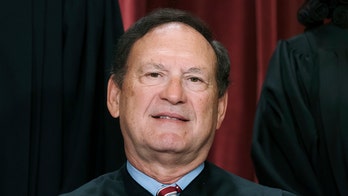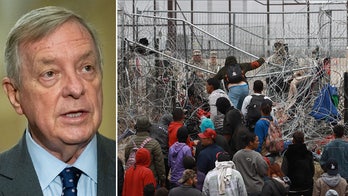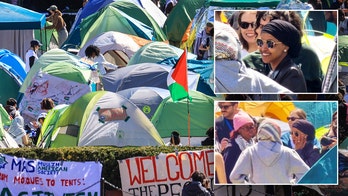A top U.S. senator said Tuesday he would support a no-fly zone over Syria in the wake of Friday's massacre, though the Obama administration pushed back on the question of military force -- so far limiting the latest U.S. response to the expulsion's of Syria's top diplomat to Washington.
In a coordinated effort, the United States joined allies around the world Tuesday in kicking out Syria's diplomats. State Department spokeswoman Victoria Nuland said the U.S. government gave Syria's charge d'affaires 72 hours to leave the country.
Administration officials described the move as a statement by world powers about their collective "revulsion" toward the "vile" killings carried out by the regime and its "thugs."
But it immediately raised further questions about whether any of those countries, including the U.S., are edging toward the possibility of military action in the country.
Sen. Lindsey Graham, R-S.C., said Tuesday that he would support a no-fly and no-drive zone in Syria, suggesting the U.S. faces a greater call to get involved militarily in Syria than it did in Libya last year.
"Compared to Libya, the strategic upside of taking out (Syrian President Bashar) Assad is far greater," he said. "We've used force to stop slaughter less strategic and egregious than this."
Asked Tuesday about what comes next, White House Press Secretary Jay Carney said "military action is always an option." But he warned military intervention could lead to "greater chaos" and "carnage."
"We do not believe that ... further militarization of the situation in Syria at this point is the right course of action," Carney said.
Carney said the administration would with its allies "assess further steps if that becomes necessary."
"This weekend's massacre is a horrifying testament to this regime's depravity," he said.
The Obama administration confirmed earlier Tuesday that it was joining other nations in kicking out Syria's top diplomat. The move followed Friday's massacre in Houla, in which 49 children and 34 women were among the 108 people killed, according to the U.N.
"In response to the May 25 massacre in the village of Houla, today the United States informed the Syrian Charge d'Affaires Zuheir Jabbour of his expulsion from the United States," Nuland said in a statement. "We took this action in coordination with partner countries including Australia, Canada, Spain, the United Kingdom, Italy, France and Germany."
Nuland said "the vicious assault" involved tanks and artillery "that only the regime possesses."
"There are also reports that many families were summarily executed in their homes by regime forces," Nuland said. "We hold the Syrian government responsible for this slaughter of innocent lives. This massacre is the most unambiguous indictment to date of the Syrian government's flagrant violations of its U.N. Security Council obligations ... along with the regime's ongoing threat to peace and security."
Nuland, in a briefing later with reporters, also implicated Iran - referring to an Iranian general's published statements that Iranian forces were in Syria. Nuland said Assad's regime was "aided and abetted" by the Iranians.
According to Reuters, Russian Foreign Minister Sergei Lavrov also spoke with U.N. envoy Kofi Annan Tuesday and urged both sides to stop the violence.
In a meeting with Assad, Annan said Syria is at a "tipping point" and that he appealed for the country to take "bold steps now -- not tomorrow."
Annan said Assad condemned the killings and added that he would allow "unfettered access for the UN and aid agencies" to deliver humanitarian aid.
The killings Friday in Houla, a collection of farming villages in Syria's Homs province, marked one of the deadliest single events in the 15-month-old uprising against Assad's rule.
French President Francois Hollande told reporters Tuesday that Ambassador Lamia Shakkour will be notified "today or tomorrow" that she must leave.
Hollande said that after high-level discussions with British Prime Minister David Cameron and U.N. Secretary General Ban Ki-moon, it had been decided to deploy "a certain number of ... pressure tactics," against Syria, including the expulsion of the ambassador.
British officials said that the U.K. is expelling three Syrian diplomats to protest the killings, among them Charge d'Affaires Ghassan Dalla -- the country's top-ranking diplomat in London. The officials demanded anonymity because they said they were not allowed to discuss the action ahead of a planned public statement from Foreign Secretary William Hague.
The ambassador to Germany, Radwan Loutfi, was given 72 hours to leave Germany on Tuesday. Foreign Minister Guido Westerwelle said Germany and its allies hope "that this unambiguous message does not fall on deaf ears in Damascus."
The Italian Foreign Ministry said Ambassador Khaddour Hassan was called to the ministry and informed of his new status -- which also was extended to an unspecified number of Syrian functionaries.
Spain said it was giving Syrian Ambassador Hussam Edin Aala and four other diplomats based in Madrid three days to leave the country.
Switzerland also said Syrian ambassadors were unwelcome.
In Canberra, Australian Foreign Minister Bob Carr said Charge d'Affaires Jawdat Ali, the most senior Syrian diplomat in Australia, is to be expelled along with another diplomat from the Syrian Embassy. He said they were told to leave the country within 72 hours, in response to the massacre in Houla.
"This is the most effective way we've got of sending a message of revulsion of what has happened in Syria," Carr said.
In a statement, he called the killings a "hideous and brutal crime," and said Australia would not engage with the Syrian government unless it abides by a U.N. cease-fire plan.
In Vienna, Foreign Ministry spokesman Nikolaus Lutterotti said the Syrian ambassador is being summoned to the ministry where officials will deliver a very hard protest about the massacre.
When asked if the expulsions were EU-wide, Lutterotti said this had not yet been decided. He said the ambassador to Austria would not be expelled as he holds an additional function as the representative to the UN organizations in Vienna.
The U.N. estimates 9,000 people have been killed since the uprising began in March 2011.
The U.N. said Tuesday that entire families were shot in their homes during a massacre in Syria last week that killed more than 100 people, including children. Most of the victims were shot at close range, the U.N. said.
Rupert Colville, a spokesman for the U.N. High Commissioner for Human Rights, said the conclusions were based on accounts gathered by U.N. monitors and corroborated by other sources. He said U.N. monitors found that fewer than 20 of the 108 people killed in the west-central area of Houla were killed by artillery fire.
"Most of the rest of the victims were summarily executed in two separate incidents," Colville told reporters in Geneva. "At this point it looks like entire families were shot in their houses."
He said witnesses blamed pro-government thugs known as shabiha for the attacks, noting that they sometimes operate "in concert" with government forces.
The killings in a collection of villages called Houla near the central Syrian city of Homs last week have drawn fresh attention to the Syrian conflict, in part because of the brutality of the massacre.
Activists posted amateur videos online showing shells exploding in the village, dismembered bodies lying in the streets, then rows of dozens of dead laid out before being buried in a mass grave.
The U.N. has said government forces fired tank shells and artillery at Houla, but stopped short of blaming them for Friday's killings. Activists said most of the victims were killed by pro-government thugs who stormed the area after clashes with local rebels, but the regime categorically denied any involvement.
Hollande said Tuesday that Paris will host a meeting in early July of the so-called Friends of Syria seeking a diplomatic solution to the conflict.
The Syrian ambassador to Britain left the country in March. The United States and Britain have closed their embassies in Syria.
The Associated Press contributed to this report.





